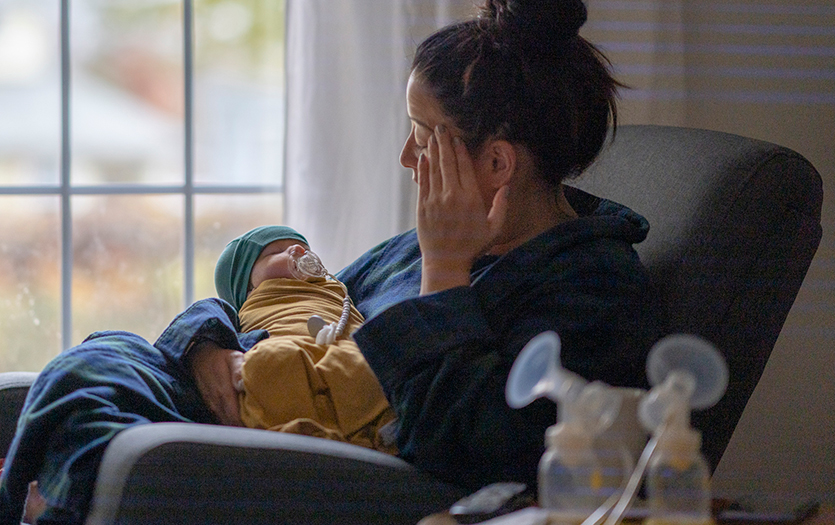
This post was written by Sarah Michelle Moore, CNM, PMHNP-BC, PPG – Psychiatry.
Postpartum depression (PPD) has existed for as long as people have been having babies. Unfortunately, in prior decades, it wasn’t discussed publicly. In fact, it was common for new mothers who were struggling with depression to pretend like they were okay until they couldn’t anymore, at which point they might end up in a hospital or staying with relatives until they could “pull themselves up.”
Many people assume that the postpartum period is one of the happiest times in a mother’s life and expect to see new mothers acting accordingly. But this expectation is shifting, as we now know that PPD is relatively common. Let’s take a closer look at postpartum depression, who it affects and tips for how to best support new parents during a challenging phase of life.
What is postpartum depression (PPD)?
On its own, postpartum depression is not an official diagnosis in the Diagnostic and Statistical Manual (a guide to mental health diagnoses). Rather, PPD is a subset of major depressive disorder, distinguished by having a “postpartum onset.” That means that PPD is a major depressive episode and is much more than the baby blues.
Who can get PPD?
Anyone who has given birth within the last year is at risk of developing PPD. Postpartum depression affects up to 15% or 1 in 7 births. The exact cause of PPD isn’t known and there are many different factors that might contribute to someone developing PPD. Hormonal changes, sleep deprivation and a lack of social support can increase your chances of developing PPD.
See more on sleep tips for new mothers here.
In addition, those who have a history of mood disorders (depression or bipolar disorder) and/or anxiety disorders are at an increased risk of developing PPD or another postpartum mood or anxiety disorder. This is especially true if those disorders were untreated (active symptoms without medication) when entering the postpartum period.
What are the symptoms of PPD? What should I look out for?
Many women have the baby blues after birth. However, the baby blues usually go away within a few days. If your symptoms last for longer than two weeks or are very intense, you might have postpartum depression and should contact your provider.
Symptoms of postpartum depression include:
- Crying easily
- Excessive worrying
- Difficulty sleeping or sleeping too much
- Trouble with concentration
- Difficulty making decisions
- Trouble with hygiene
- Lack of interest in things you usually enjoy
- Poor appetite or overeating
- Show too much or not enough concern for your baby
Some people experiencing PPD feel as if they are a “bad mom/parent” because of their feelings of sadness, hopelessness and helplessness. They may feel like they’re not as attached to their baby as they should be because of the depressed feelings, which leads to more sadness and guilt.
What to avoid saying to someone in the postpartum period
Sometimes, when trying to give advice or encouragement to a new parent, well-meaning family and friends say things that can bring on feelings of guilt or shame for the new parent. If you’re a new mother who is struggling to enjoy this time and bond with your baby, it can be difficult and painful to hear advice like, “You’re going to miss this when it’s over,” “Enjoy it while it lasts,” or “They grow up so fast.”
Since you don’t know what kind of emotions a new parent might be feeling, it’s better to avoid statements that suggest new parents should be happy and joyful during this time.
How to support someone in their postpartum period
Offering help around the house or a listening ear to someone newly postpartum is much more helpful than platitudes. Here are a few suggestions of what to say to someone in the postpartum period:
- “What can I do to help?”
- “Do you want me to watch the baby so you can take a nap/shower/eat?”
- “Let me do the dishes for you while you feed the baby.”
- “I want to fold laundry while we visit today- where can I grab the laundry basket?”
- “I brought you a warm meal for the family, so you don’t have to cook.”
- “I’m here for you if you need me.”
- “You seem like you need to talk- how are you feeling?”
People often say, “It takes a village to raise a child,” and generally that village is most needed during the first year of a child’s life. Parents need hands-on support to get through one of the hardest years of parenthood. Research suggests that new parents who have good social support are less likely to experience PPD and if they do, they have less severe outcomes than those who do not.
Why is the postpartum period so important?
The first three months of life are focused on bonding between the primary parent/mother and the baby. That bond is built through eye contact; talking during feeds; playing with the baby; engaging with and smiling at the baby; and responding to the baby’s cries and needs. When the baby’s cries are responded to the baby learns to trust their caregiver. A connection is built that their caregiver will meet the baby’s needs. This leads to a secure attachment style, which can follow the child through their life. Remember, an infant cannot be spoiled. The more interaction, the better!
During the first year of life children also meet many developmental milestones—sitting up, first words, crawling and sometimes walking. The more interaction and trust that the baby has with caregivers, the more likely they are to meet milestones on time. It’s important to note that this is for neurotypical babies, not necessarily babies born with special needs. Though babies born with special needs also need love and attention so they can meet their highest potential.
Where to find help and support postpartum
Help is available. Here are a variety of support resources available to you, including right here at Parkview. Need an appointment? Call 260-481-2774 and ask to schedule with Sarah Michelle Moore (who specializes in maternal mental health) or any of our other wonderful providers.
Additionally, Postpartum Support International has a plethora of support groups for moms, dads, nonbinary parents, and other caregivers who are struggling in the first year of life. Please reach out and allow others around you to be your “village.”
Resources
Postpartum Support International: Information, Support Groups, and HelpLine
National Maternal Mental Health Hotline
Call or Text 1-833-943-5746
References
American Psychiatric Association (APA) (2022). Diagnostic and Statistical Manual (DSM)
(V-TR). Washington, DC: American Psychiatric Association Publishing.
Hutner, L. A., Catapano, L. A., Nagle-Yang, S. M., Williams, K. E., & Osborne, L. M. (2022).
Textbook of Women’s Reproductive Mental Health. American Psychiatric Assocation Publishing:Washington DC.
Massachusett’s General Hospital (MGH) (2023). Psychiatric Disorders during Pregnancy.
Nursing@Georgetown (2019). Postpartum Depression: Signs and Resources for Help.
Postpartum Support International (PSI) (2023). Depression during pregnancy and postpartum.



